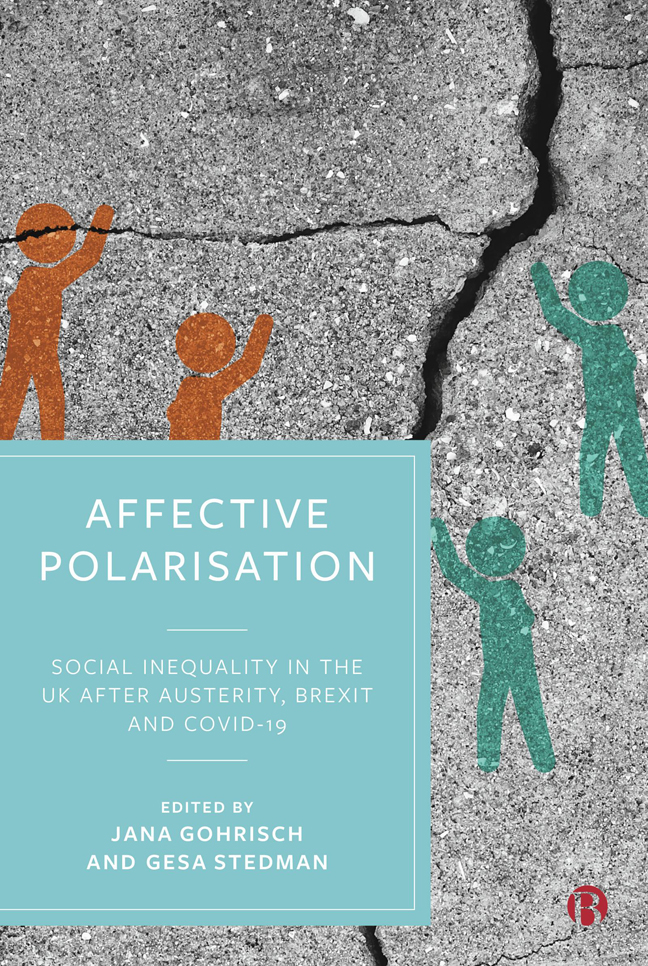Book contents
- Frontmatter
- Contents
- List of Figures, Tables and Boxes
- Notes on Contributors
- Acknowledgements
- Introduction
- 1 The Divided Left in the UK: Partisanship, Ideology and Class after Brexit
- 2 Populism and the People: Elitism, Authoritarianism and Libertarianism
- 3 ‘Coloring the Utterance with Some Kind of Perceivable Affect’: Constructing ‘Country’ and ‘People’ in Speeches by Theresa May and Boris Johnson – A Linguistic Perspective
- 4 The Challenges of Polarisation: Lessons for (Re-)Politicising Inequality across Four English Towns
- 5 “Go Away, But Don't Leave Us”: Affective Polarisation and the Precarisation of Romanian Essential Workers in the UK
- 6 Racialised Affective Polarisation in the UK
- 7 “Now You Have to Listen”: A Historical Analysis of Britain’s Left-Behind Communities
- 8 Britain in a State of Emergency: Studying Ken Loach's Films I, Daniel Blake (2016) and Sorry We Missed You (2019)
- 9 Cloaking Class: Making the Working Class Visible
- 10 Class, Poverty and Inequality in Scotland: Independence and the Creation of Affective Polarisations
- 11 Language and Identity: The Taliesin Tradition
- Conclusion
- Index
10 - Class, Poverty and Inequality in Scotland: Independence and the Creation of Affective Polarisations
Published online by Cambridge University Press: 23 January 2024
- Frontmatter
- Contents
- List of Figures, Tables and Boxes
- Notes on Contributors
- Acknowledgements
- Introduction
- 1 The Divided Left in the UK: Partisanship, Ideology and Class after Brexit
- 2 Populism and the People: Elitism, Authoritarianism and Libertarianism
- 3 ‘Coloring the Utterance with Some Kind of Perceivable Affect’: Constructing ‘Country’ and ‘People’ in Speeches by Theresa May and Boris Johnson – A Linguistic Perspective
- 4 The Challenges of Polarisation: Lessons for (Re-)Politicising Inequality across Four English Towns
- 5 “Go Away, But Don't Leave Us”: Affective Polarisation and the Precarisation of Romanian Essential Workers in the UK
- 6 Racialised Affective Polarisation in the UK
- 7 “Now You Have to Listen”: A Historical Analysis of Britain’s Left-Behind Communities
- 8 Britain in a State of Emergency: Studying Ken Loach's Films I, Daniel Blake (2016) and Sorry We Missed You (2019)
- 9 Cloaking Class: Making the Working Class Visible
- 10 Class, Poverty and Inequality in Scotland: Independence and the Creation of Affective Polarisations
- 11 Language and Identity: The Taliesin Tradition
- Conclusion
- Index
Summary
Introduction
The 2014 Scottish independence referendum and the continuing movements towards a second referendum (‘Indyref 2’) provide opportune examples for the examination of the development of affective polarisation in Scotland. The concept of opinion-based identities as differentiated from identities of a more historic and structural form, notably class, gender, race and ethnicity, emerges from the discipline of political science. Here the focus is upon singular events, namely referenda or parliamentary elections, whereby voters are required to make binary choices, rather than being defined by the historical social and legal structures in capitalist states (Iyengar, Sood and Lelkes, 2012, Iyengar et al, 2019; Hobolt et al, 2021). As such the 2014 Scottish independence referendum and the likely Indyref 2 provide useful case studies for this approach.
Nation states and nationalism represent two of the most defining features of structural forms of traditional insider and outsider identities. Emerging in the rise of capitalism, the nation state defined geographic boundaries and forms of political, social, linguistic and economic development within a unified legal framework. While modern nation states developed within the European context during the mid-19th century's bourgeois revolutions, the developments within Great Britain arguably have deeper roots. The 1707 Act of Union between Scotland and England, coming after the English Civil War of the 17th century, facilitated the unification of the British state and provided the basis for the economic and social developments of the 18th and 19th centuries, ensuring Britain emerged as the first industrial nation and subsequent dominant global power (Hobsbawm, 1962; Daunton, 1995; Davidson, 2012). However, the current form of the state arose later than states within continental Europe, with the retention of six of the nine counties of Ulster within a United Kingdom following the independence of the Irish state in 1921.
Identification with nation and the feelings of belonging to a particular national community thus might be considered to be reflective of a traditional concept of structural identity. However, the growth of support for Scottish independence in the months prior to the 2014 independence referendum may still legitimately lead us to understand and apply the concept of opinionbased identities within the framework of affective polarisation.
- Type
- Chapter
- Information
- Affective PolarisationSocial Inequality in the UK after Austerity, Brexit and COVID-19, pp. 199 - 211Publisher: Bristol University PressPrint publication year: 2023



